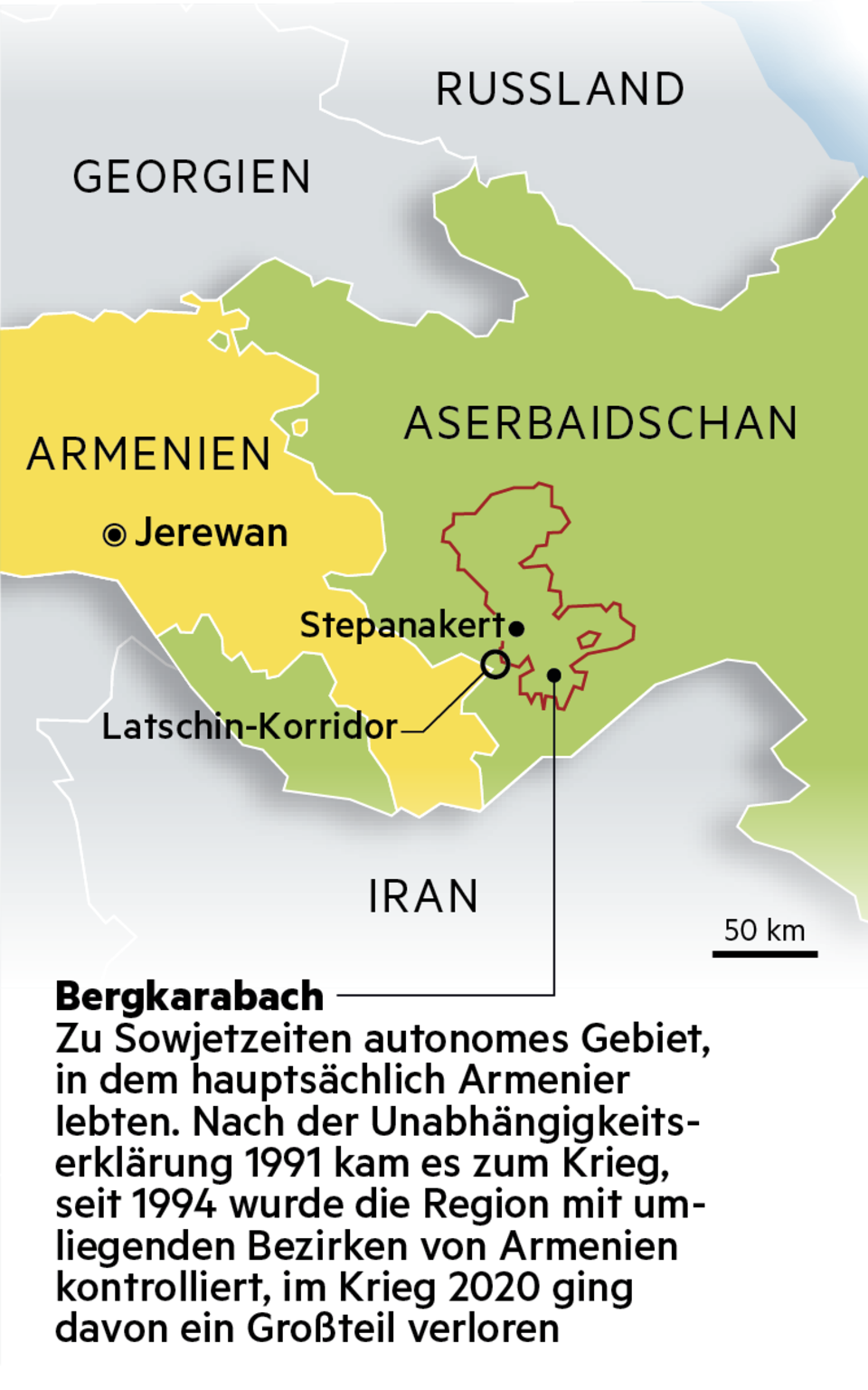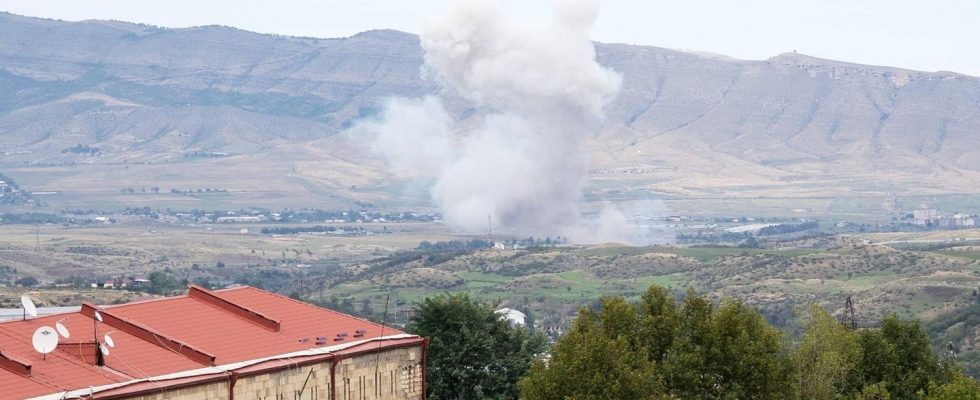analysis
Attack on Nagorno-Karabakh
Azerbaijan is waging war because it can – the EU is condemned to watch
© Aik Arutunyan / Imago Images
Azerbaijan is attacking Nagorno-Karabakh, which is populated by Armenians, and the people living there are apparently to be expelled. The EU can only watch – also because it is dependent on gas from Baku.
The conflict over the small region on Azerbaijani territory is complex: traditionally inhabited by Armenians, the autonomous region during Soviet times became independent in a war against Azerbaijan in 1988. In a war that lasted until 1994, the Armenians also occupied a huge buffer zone around Nagorno-Karabakh and destroyed towns inhabited by Azerbaijanis such as Agdam. Since then, the repatriation of the territories has been part of the raison d’etre in Azerbaijan; the hatred of the Armenians has been nurtured by the state year after year.

Three years later, with the West absorbed by Russia’s war against Ukraine, Azerbaijani autocrat Ilham Aliev seems to see an opportune moment to decide the conflict in his favor: Since December 2022, Azerbaijan has increasingly isolated Nagorno-Karabakh by cutting off the land connection towards Armenia via the so-called Lachin corridor. Under these circumstances, of the 140,000 Armenians who once lived in Nagorno-Karabakh, there are probably 60,000 to 70,000 left.
In messages sent to Armenian residents via leaflets and online, Azerbaijan now claims that the attacks are not directed against the civilian population and that humanitarian corridors have been set up “on Lachin Street and in other directions.” In fact, this means that the Armenians who remain in the capital Stepanakert and other settlements will have to flee to Armenia if they do not want to fall into the hands of the Azerbaijanis. Because without outside support, Nagorno-Karabakh’s defenses will soon collapse. All that could remain are guerrilla groups in the forests.
Even the Armenian state is holding back
Nagorno-Karabakh cannot count on support even from its closest ally: the Armenian state, which had supported the internationally unrecognized Republic of Nagorno-Karabakh economically and militarily for as long as this was practically possible. In a statement on Tuesday afternoon, Armenian Prime Minister Nikol Pashinyan was as distant as possible: There are attempts by external and internal forces to drag Armenia into the war, but they will not succeed. Pashinyan emphasized that the Armenian army is not present in Nagorno-Karabakh.
Realistically speaking, since the loss of the direct land connection to Nagorno-Karabakh in 2020, Armenia can hardly do anything for the Armenians there. A military advance towards Stepanakert is hopeless in the mountainous area. Especially since that would mean open war against the highly armed Azerbaijan. But whether Pashinyan, who was elected in 2018 on a pro-European wave, will politically survive the loss of Nagorno-Karabakh is uncertain: for many years the Armenian political elite was dominated by Karabakh fighters, and a possible loss of Nagorno-Karabakh has been historically linked to the Armenian genocide in the Ottoman Empire Reich 1915. Former President Robert Kocharian, who comes from Nagorno-Karabakh, could now use the opportunity to overthrow Pashinyan. In the afternoon, the first protests against Pashinyan took place in Armenia’s capital Yerevan.
With former President Kocharyan, who is friends with Kremlin ruler Vladimir Putin, we get to the inglorious role that Russia plays in the conflict: Traditionally, Armenia was Russia’s closest ally in the South Caucasus, and Moscow has been considered a protective power for the Armenians since the beginning of the 20th century against the Turks. The Russian military is present in Armenia itself with around 3,500 soldiers, and Russia and Armenia are even in a joint military alliance through the “Collective Security Treaty Organization” (CSTO). Moscow brokered the 2020 ceasefire and stationed troops – officially 2,000 men – in Nagorno-Karabakh to monitor it.
Now the Armenians have to learn that the former protecting power is passively watching Azerbaijan’s offensive. Moscow’s calculation may be to bring about Pashinyan’s downfall and restore his influence in Armenia through a pro-Russian government.
At the same time, Aliev’s attack, regardless of the Russian troop presence, also shows that Moscow has significantly lost influence in this region.
This has also decreased over the last few years under Pashinyan because Europe increased its efforts towards Armenia: The EU, especially French President Emmanuel Macron and EU Council President Charles Michel, made intensive efforts to find a peaceful solution to the Nagorno-Karabakh conflict.
The EU needs the gas
A meeting between Aliev and Pashinyan with Chancellor Olaf Scholz, Macron and Michel in Granada was even planned for October 5th. However, the probability of such a peak is now trending towards zero. In addition to his own military strength, an important reason why Azerbaijani President Aliev has chosen the path of war instead of negotiations is his conviction that he cannot expect any sanctions from the EU other than words of concern: because it is only 14 months There, EU Commission President Ursula von der Leyen appeared with a friendly smile in Baku next to Ilham Aliev, with the flags of the EU and Azerbaijan behind them. In order to make himself more independent of Russian gas, von der Leyen had just signed an agreement that would double gas exports to the EU over the next five years. At that moment, Aliev knew that he would have a largely free hand over Nagorno-Karabakh.


